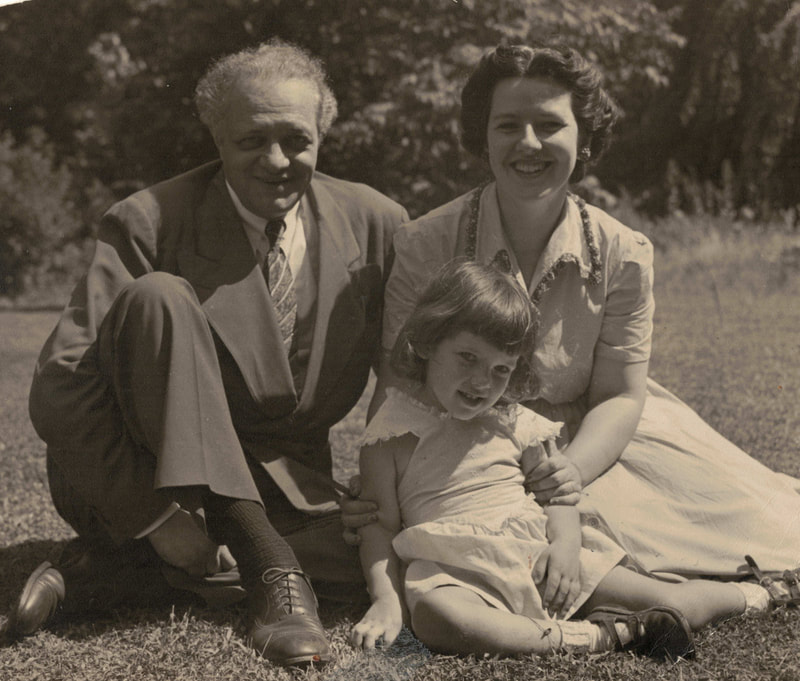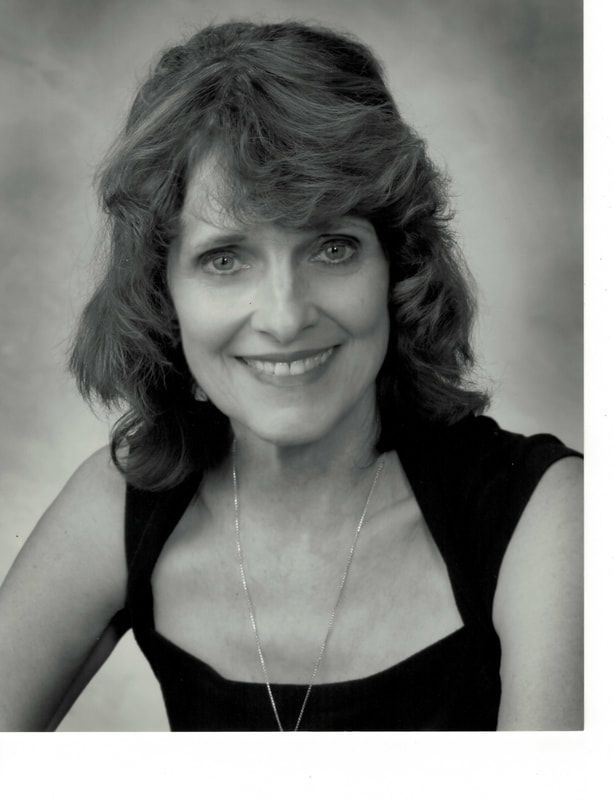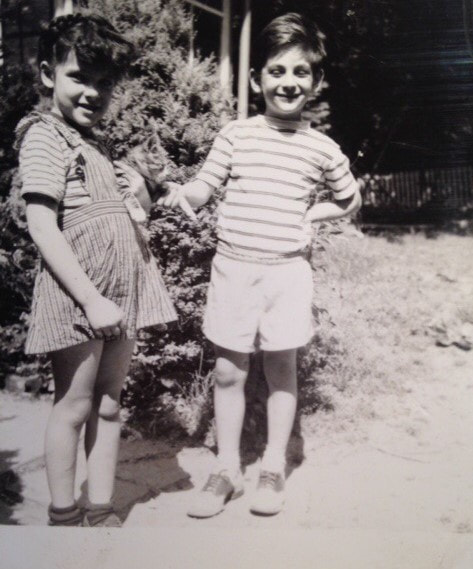|
By Karen Carnabucci, LCSW, TEP I never met Dr. J.L. Moreno, the European-born physician who is widely celebrated as the man who revolutionized psychiatric treatment. A pioneer in improvisational theater and a social scientist fascinated with relationships in groups, he prodded us to accept a new and vigorous way to relate to our world with the method of dramatic play that he called psychodrama. However, I had the good fortune to study closely for several years with Zerka T. Moreno, Dr. Moreno’s third wife, who is now credited as the co-developer of psychodrama. Zerka is known not only for shaping psychodrama while J.L. was alive but also for refining and polishing the method after his death in 1974 through her teaching, writing and traveling. And I have had the lovely opportunity to befriend Dr. Moreno’s daughter, Regina Moreno, who has asked me to assist with the writing of her book Words of the Daughter: A Memoir, where she warmly reveals more about the father of this method, the important contributions of her stepmother Zerka to this blended family away from the psychodrama stage, and especially her mother Florence’s hidden role in developing distinct psychodramatic and sociometric innovations of her own. Gina – as later called herself – died on June 19 in Berkeley, Calif., after a long and interesting life, a life mostly centered on psychodrama, relationships and adventure. Gina and I met in the early 1990s at Boughton Place, the small retreat center in rural Highland, N.Y., where Zerka was conducting monthly trainings on the original Moreno stage. Gina was a frequent participant in those trainings, which attracted aspiring psychodrama practitioners from throughout the East Coast and Europe, Asia and Latin America. I came to know Gina as a wonderful auxiliary, not the least because she once played my child self during a drama about my visit to the doctor’s office. Her acting, as she giggled and squirmed around the doctor’s examining table pretending to be me, made the drama real and profound, offering a cascade of tumbling insights and awareness about my relationship with my mother, illness and wellness, and my younger self. When I realized that she was the daughter of Dr. Moreno, it made sense that she had a special relationship with psychodrama; she understood the method in a particularly intimate way that the rest of us did not, even though all of us were fascinated by the method and were investing much in learning it. Because I love history and always enjoyed hearing Zerka’s stories about the early days of the Beacon Hill Sanitarium, I jumped at the opportunity to stay overnight at Zerka’s little house during one training weekend. My motel had overbooked our rooms, so Zerka generously invited me and a friend to stay at her home. I was as star struck as a young trainee could be, realizing that Dr. Moreno had walked these very rooms, dictating his volumes while Zerka typed, where Gina and her brother Jonathan had grown up. As years passed, Gina and I warmly connected during the yearly ASGPP conferences, sometimes for a few minutes and sometimes more in depth. In 2016, when I guest edited the ASGPP special edition journal to commemorate Zerka Moreno’s life and death, I asked Gina to share her memories of her stepmother, since they are an important part of psychodrama history. Gina contributed the chapter “Growing Up with Zerka,” brimming with fantastic memories of her younger years, which had never been published. As we renewed our friendship, she expressed curiosity about my work with Family Constellations, the experiential method developed by Bert Hellinger which focuses on the ancestral family system, which has similarities to psychodrama. She showed up at my workshops at the conferences, volunteering to be protagonist in a session about her relationship with the maternal grandmother she never knew. Later in 2017, she attended the Family and Systemic Constellations conference in Virginia Beach, Virginia. Upon my invitation, she wrote an article about her experiences at the conference and what her father might have thought about Hellinger’s creation, for The Knowing Field, the English language journal of Family and Systemic Constellations, the next year. Now the stories started flowing, not only about Zerka, but about her other grandmother, Pauline Levy, who was her father’s mother, and her mother and extended family including her beloved Uncle Joseph Moreno, her Aunt Anne and her cousin Joseph. Finally, Gina approached me to assist with her memoirs. She had taken writing classes in her home community of Berkley, California, and wanted help to stitch together her memories into a full-length book. Psychodrama and role reversals Our online sessions made good use of the method that her father originated. We doubled and role reversed with her parents, her stepmother Zerka, her maternal grandparents, the stage, her girlhood companion and friend Gretel Leutz, and the tall apple tree in the back yard of the “Little House,” what the family called their bungalow home that stood not too far from the “Big House,” as the sanitarium was known. Oh, yes, we also role reversed with Gina’s computer, which always seemed to prove itself uncooperative, returning her to habit of writing in longhand in her journal, which she found easier and familiar. In our role reversals, we named the misbehaving computer “Mack,” and the computer finally seemed to act more helpfully. As each story moved from memory to print, we collaborated in identifying the sequence of chapters. Gina wrote to her mother’s colleges, asking for transcripts and course details and renewed friendships with high school classmates. She talked with her brother Jonathan Moreno and her older cousin Ruthie, from her mother’s side. I searched on my computer, learning more about the city of Beacon and its surrounding landmarks and nearby places, including the rustic lodge where she and her mother visited after her parents’ divorce. Along the way, I realized that my life and Gina’s life shared several parallels, including an intelligent and visionary mother who suffered mental illness and a warm and loving father consumed by his work (in my case, my father was a barber and small businessman, not an internationally known psychiatrist!). Both of us grew up as only children and found solace in imagination, creativity and cats. No wonder we seemed to have such great tele! Important contributions to the field I’m proud that Gina’s memoir adds to the psychodrama literature and understanding about Moreno’s private life. It’s an important contribution to the psychodrama community, especially those who want to understand the private Dr. Moreno and begin to value the contributions of Florence, who later remarried and became Florence Bridge Moreno Gunsher. I like to think that the memoir is also a precious gift to Gina’s family. That includes her daughter Miriam Zachariah, a retired school principal and certified psychodrama trainer interested in conflict resolution who lives in Canada, and her son Benjamin Zachariah, a musician with an interest in languages who lives in California. And that goes for Miriam and Ben’s children too – they are all part of the family who carry the ancestral legacy of psychodrama that we love so much. About Karen
Karen Carnabucci, LCSW, TEP, is the founder of the Lancaster School of Psychodrama and Experiential Psychotherapies in Lancaster, Pa., which teaches transformational learning in a variety of experiential methods and practices, including psychodrama, sociometry, Family and Systemic Constellations, sand tray, group skills and more. Subscribe to her e-letter for professionals and get first notice of training events, Early Bird discounts, helpful links and inspiring and supportive info. You may subscribe here.
0 Comments
Your comment will be posted after it is approved.
Leave a Reply. |
AuthorKaren Carnabucci, LCSW, TEP, is an author, trainer and psychotherapist who promotes, practices and teaches experiential methods including psychodrama, Family and Systemic Constellations, sand tray, mindfulness and Tarot imagery. Archives
December 2023
Categories
All
|



 RSS Feed
RSS Feed